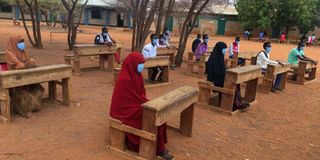Court extends order stopping community learning

Pupils at Lafey Primary School on August 19, 2020 when community learning kicked off in Mandera.
What you need to know:
- But Mr Aura challenged the plan, saying Kenyans were not consulted.
- He said in-person rather than virtual learning is ideal for children.
- CSs Kagwe and Magoha said an unplanned reopening of schools would contradict the Covid-19 precautionary principal.
- The court held that restrictions on movement and gatherings are reasonable.
The planned community-based learning will not begin any time soon after the High Court extended an order stopping the programme.
The court extended the August 25 interim directive that stopped the Ministry of Education from rolling out the programme, pending the hearing and determination of a case filed by Mr Joseph Enock Aura, a parent.
The ministries of Education and Health, together with the Teachers Service Commission (TSC), intended to start the community-based programme as a way of engaging learners during the Covid-19 pandemic.
The ministries and TSC said the aim of the plan was to equip learners with practical skills and basic knowledge related to coronavirus.
Challenged plan
But Mr Aura challenged the plan, saying Kenyans were not consulted.
He also accused the ministries of “exhibiting reckless indifference” to the possibility of causing pain and suffering on the learners.
“There is an escalation of teenage pregnancies, exposure to online pornography and delinquency since children lack parental care during daytime,” argued the petitioner.
Education Cabinet Secretary George Magoha and his Health counterpart Mutahi Kagwe opposed the petition.
They said an unplanned reopening of schools would contradict the Covid-19 precautionary principal and containment measures.
“Reopening the schools will undermine the measures,” the two ministers said, adding that the matter of reopening the economy and public institutions as demanded by Mr Aura had been sufficiently addressed by the court in a petition filed by the Law Society of Kenya.
Restrictions reasonable
In that case, the court held that restrictions on movement and gatherings are reasonable and justified in light of the coronavirus pandemic.
However, Mr Aura said in-person rather than virtual learning is ideal for children and urged the court to compel the government to reopen schools this month.
But the CSs said there has to be a balance between the right to life and right to education.
“Reopening schools is not an event. It requires planning, resources and development of protocols to protect learners and their minders, parents, guardians and the community,” they said.
To ensure continuity of lessons during the Covid-19 period, the government instituted remote learning interventions, they added.
“These include provision of lessons and digital content through radio, Zoom, television, webinars and Kenya Education Cloud. The respondents also rolled out the community-based learning,” reads the response.
Safe learning
The two said the government is working to ensure schools reopen to safe learning environment
They said the Covid-19 Education Response Committee came up with Guidelines on Health and Safety Protocols for Reopening of Basic Education Institutions Amid Covid-19 in July.
The guidelines provide for the social distancing – detailing the requirement for more classrooms, boarding facilities, library space, ablution, kitchens, safety and security, transport, institutional grounds, dispensaries and community relations protocols.
The guidelines call for measures dealing with availability of water, respiratory etiquette, hand hygiene, food handlers, dish and cutlery cleaning, waste management, temperature monitoring and self-screening mechanisms.
The case will be mentioned on October 6.




